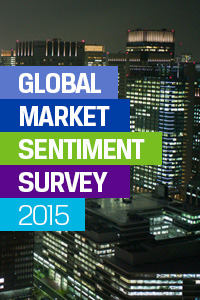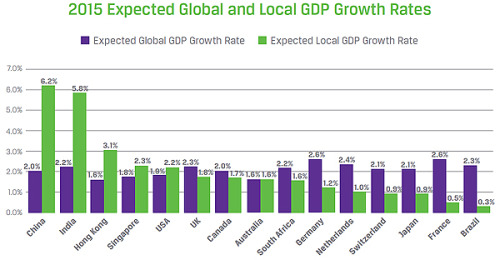Americas Market Outlook: Tepid Economic Growth, Political Risk, Ethics to Define 2015
CFA Institute members expect modest economic growth in the coming year, according to the recently published Global Market Sentiment Survey. The survey of more than 5,200 global financial professionals pegs global GDP growth at a tepid 2% for 2015, far below the 3.4% recently forecast by the World Bank. Continued headwinds in emerging markets, halting growth in the developed markets of Europe and Japan, and global political instability are just some of the dynamics tempering expectations growth expectations.
In the Americas, CFA Institute received survey participant responses that were statistically significant from the United States, Canada, and Brazil. US survey respondents were most optimistic, though cautiously so. They expect US GDP to grow by 2.2% in 2015. In Canada, the expected growth rate was 1.7%, while in Brazil, pessimism reigns with an expected growth rate of only 0.3%. (At the time the survey was conducted, Brazil’s run-off presidential election had not yet concluded, so the impact of President Dilma Rousseff’s re-election may not be fully reflected.) Brazil has company: as survey respondents in Switzerland, Japan, and France all expect home GDP growth of less than 1%, on average, in 2015.
Survey respondents in Brazil (38%) and the US (32%) see weak developed market economies as the biggest risk to global markets in 2015, while their Canadian counterparts are equally split between weak developed market economies (23%) and political instability (23%) as the biggest risks to global growth.
When asked to consider the biggest risk to their own economies, more than half of Brazil respondents (53%) answered political instability, about a quarter of survey takers in Canada (23%) were most concerned about weak emerging market economies, while US respondents saw weak developed market economies as the biggest risks to their market.
Political Risk Tops Underestimated Risks
Globally, the survey found that political risk, including secessionist and nationalistic movements, is the biggest underestimated risk that could negatively impact global capital markets over the next five years. How does that compare with sentiments in the Americas region? Survey respondents in the United States (25%), followed by Canada (23%), are the most concerned about political instability as a negative factor in global market performance.
The second-most underestimated global risk identified by members was the demographic trend of aging populations (20%). Members in some markets perceive this risk more acutely than others. In Canada for example, by 2050, 31% — or nearly a third of all Canadians — will be 60 years of age or older, according to the Global AgeWatch Index 2014. So, it is perhaps not surprising that more than a quarter of respondents in that market (26%) flagged Canada’s aging population as a key risk.
Investment Market Structure Concerns and Solutions
Globally, 28% of survey respondents indicated that improved regulation and oversight of global systemic risk is the regulatory or industry action most needed in 2015 to help improve investor trust and market integrity. Improved transparency of financial reporting and other corporate disclosures was the second-most-cited action globally (21%).
In the Americas, however, answers to this question ran the gamut. Indeed, Brazilian respondents were most likely to cite improved enforcement of existing laws and regulations (47%) and improved corporate governance practices (29%) as the most-necessary actions. In Canada, improved transparency of financial reporting and other corporate disclosures was the top choice (31%), followed by improved market trading rules on transparency and frequency of trades (22%). In the United States, 28% of survey respondents said improved market trading rules on transparency and frequency of trades was the action most needed to help improve investor trust and market integrity, followed by improved enforcement of existing laws and regulations (26%).
Ethics Matters
As was the case in last year’s survey, more than half of survey respondents (63%) globally point to a lack of ethical culture within financial firms as the leading cause of the current lack of trust in the financial industry. In both Canada and the United States, the firm-level action seen as most needed to improve investor trust and confidence was a better alignment of compensation with investor objectives (37% in Canada and 33% in the United States). In Brazil there was a stronger desire for zero-tolerance policies by top management for ethical breaches (41%).
When asked to identify the most serious ethical issues facing their local markets in the coming year, Brazil respondents were most concerned about the integrity of financial reporting (23%), followed by mis-selling by financial advisers (22%), and market fraud (22%). In Canada, misaligned incentives of investment management services (32%) was followed by mis-selling by financial advisers. In the United States, the largest concern was misaligned incentives of investment management services (23%), followed by market trading practices.
If you liked this post, consider subscribing to Market Integrity Insights.


